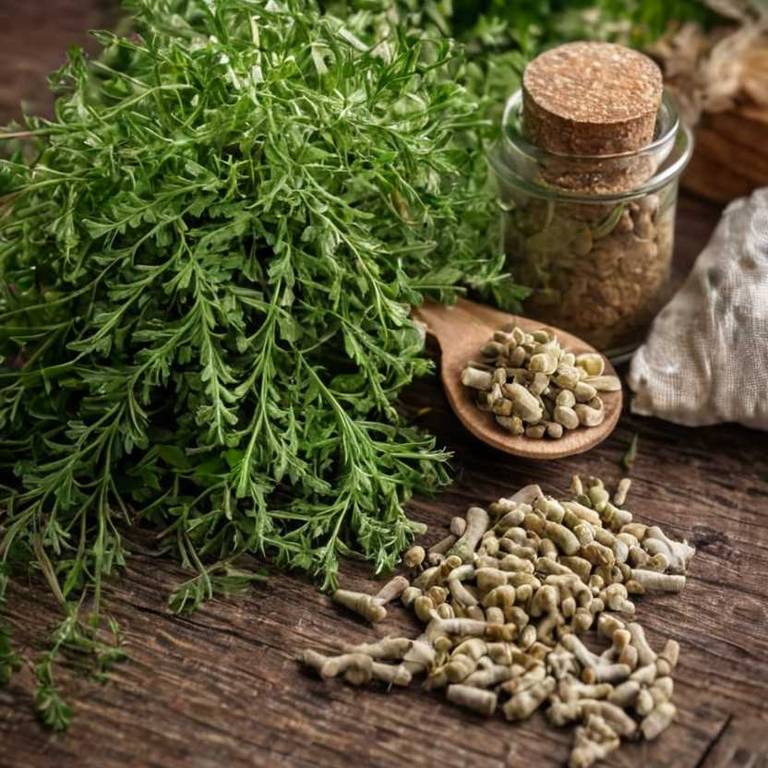By Leen Randell
Updated: Jul 06, 2024
10 Health Benefits Of Petroselinum Crispum (Parsley)

Petroselinum crispum, also known as parsley, has health benefits such as reducing inflammation, improving digestion, and acting as an antioxidant.
Its medicinal properties include its high content of vitamin C, flavonoids, and essential oils, which contribute to these benefits. For example, parsley has been used to alleviate menstrual cramps and relieve symptoms of irritable bowel syndrome.
Its anti-inflammatory properties can also help reduce swelling and pain in joints, improving daily activities and quality of life.
This article explains in details the 10 best health benefits of Petroselinum crispum.
1. Supports bone health
Petroselinum crispum supports bone health because of its rich content of calcium and vitamins K and D. Calcium is essential for building and maintaining strong bones, while vitamins K and D help regulate calcium metabolism and absorption.
Additionally, parsley's antioxidant properties may help reduce oxidative stress and inflammation, which can contribute to bone loss and osteoporosis.
By incorporating parsley into a balanced diet, individuals can potentially promote healthy bone density and reduce the risk of fractures.
2. Aids digestion
Petroselinum crispum aids digestion because of its unique composition of essential oils, flavonoids, and apigenin.
These compounds have been shown to stimulate digestive enzymes, reduce inflammation in the gut, and relax the muscles in the digestive tract, making it easier for food to pass through and nutrients to be absorbed.
Additionally, parsley has natural antimicrobial properties that help to combat bad bacteria in the gut, promoting a healthy balance of gut flora.
3. Reduces inflammation
Petroselinum crispum reduces inflammation because of its rich content of antioxidants and flavonoids.
These compounds have been shown to inhibit the production of pro-inflammatory molecules, thereby reducing swelling and pain. Additionally, parsley contains a unique compound called apigenin, which has been found to have potent anti-inflammatory properties.
This makes parsley a valuable addition to a healthy diet for those seeking to reduce inflammation and alleviate symptoms associated with conditions such as arthritis and gout.
4. Boosts immune system
Petroselinum crispum boosts immune system because of its rich content of antioxidants and flavonoids.
These compounds have been shown to increase the production of white blood cells, which fight off infections and foreign invaders.
Additionally, parsley contains apigenin, a flavonoid that has been found to stimulate the activity of natural killer cells, further enhancing the body's ability to defend against disease-causing pathogens.
5. Regulates menstrual cycle
Petroselinum crispum regulates menstrual cycle because it contains a unique combination of bioactive compounds that interact with the body's endocrine system.
The essential oils and flavonoids present in parsley have been shown to stimulate the production of hormones that govern menstruation, including estrogen and progesterone.
By balancing these hormone levels, parsley may help regulate irregular periods, alleviate symptoms of PMS, and even support fertility in women.
6. Promotes kidney health
Petroselinum crispum promotes kidney health because of its rich antioxidant and anti-inflammatory properties.
The herb's flavonoids and apigenin have been shown to reduce oxidative stress and inflammation in the kidneys, protecting them from damage caused by chronic diseases like diabetes and hypertension.
Additionally, parsley is a natural diuretic, helping to flush out toxins and excess fluids that can put a strain on the kidneys, promoting overall kidney function and health.
7. Improves vision
Petroselinum crispum improves vision because it is rich in antioxidants and flavonoids that help protect the eyes from damage caused by free radicals.
The herb's potent antioxidant properties reduce oxidative stress and inflammation in the eyes, which can contribute to age-related macular degeneration and cataracts.
Additionally, parsley's high content of vitamin A and beta-carotene supports healthy retinal function and promotes clear vision.
8. Fights bad breath
Petroselinum crispum fights bad breath because it is rich in chlorophyll, a potent natural antibacterial agent that inhibits the growth of anaerobic bacteria responsible for causing halitosis.
Parsley's volatile oils, including myristicin and apiole, have antimicrobial properties that help eliminate odors and freshen breath.
Additionally, parsley's diuretic properties help to stimulate saliva production, washing away bacteria and debris that can cause bad breath.
9. Prevents anemia
Petroselinum crispum prevents anemia because it is rich in iron and antioxidants.
The iron content helps to increase hemoglobin production, reducing the risk of anemia. Additionally, parsley's antioxidants work to combat oxidative stress and inflammation, which can contribute to anemia.
Consuming parsley regularly can help maintain healthy red blood cell counts, preventing anemia and promoting overall cardiovascular health.
10. Controls diabetes
Petroselinum crispum controls diabetes because of its unique combination of flavonoids and apigenin, a potent antioxidant.
The herb has been shown to regulate blood sugar levels by inhibiting alpha-glucosidase, an enzyme that breaks down carbohydrates into glucose.
Additionally, parsley's anti-inflammatory properties help reduce oxidative stress, which is a common complication of diabetes.